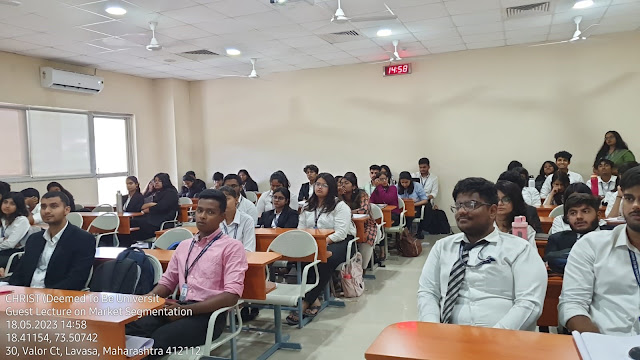MARKET SEGMENTATION
The event on "Marketing Segmentation" was an informative and engaging session that focused on providing attendees with valuable insights into market segmentation strategies. The goal was to equip participants, including students and professionals, with practical tools and techniques to effectively segment markets in today's competitive business landscape. Throughout the event, attendees gained an understanding of the importance of market segmentation and its impact on customer loyalty, product development, and marketing campaigns. Various topics were covered, including the use of market maps to visualize and understand market segmentation. This helped participants recognize the significance of considering multiple factors when segmenting a market.
The event challenged the misconception that market segmentation is fictional by showcasing how different customer segments can exist within seemingly homogeneous product categories. Participants learned the importance of understanding diverse customer preferences and tailoring offerings accordingly. Target market identification was another crucial aspect discussed during the event. Attendees gained insights into how companies analyze demographic, psychographic, and behavioral factors to identify specific customer segments. Aligning marketing efforts with the needs and preferences of these target segments enhances customer engagement and satisfaction.
The event also highlighted attribute marketing, where customers are categorized based on specific attributes. Participants learned how this approach allows companies to customize marketing strategies and offerings to suit the unique needs of each customer segment.
Additionally, the event explored different levels of market segmentation, such as segment marketing, niche marketing, and individual marketing. Attendees gained an understanding of each level and its implications for targeting specific customer segments. The significance of local marketing or grassroots marketing was emphasized. Participants learned how businesses can adapt marketing strategies to local contexts and preferences, thereby strengthening their market presence. Examples were mentioned, such as state-wise breakdowns and language-specific channels, to illustrate the importance of catering to diverse local audiences.
Overall, the event on "Marketing Segmentation" provided attendees with valuable insights and practical strategies for effective market segmentation. It aimed to empower participants with the knowledge and tools necessary to make informed decisions and drive organizational success. By applying effective market segmentation strategies, businesses can better understand their customers, develop targeted marketing campaigns, and achieve a competitive advantage in the marketplace.
OUTCOMES OF THE EVENT
Outcome1
Enhanced Understanding: Attendees gained a deeper understanding of market segmentation strategies, including the use of market maps, target market identification, and attribute marketing. They developed a comprehensive knowledge of the different levels of market segmentation, such as segment marketing, niche marketing, and individual marketing. This enhanced understanding enabled participants to effectively apply these strategies in their own marketing efforts.
Outcome 2
Targeted Marketing Strategies: The event empowered attendees to develop targeted marketing strategies tailored to specific customer segments. By recognizing the importance of segmenting markets based on consumer preferences and needs, participants learned how to create customised marketing messages and offerings that resonate with their target audience. This outcome enables businesses to better allocate resources, optimise marketing campaigns, and increase the likelihood of success in reaching their intended customer segments.






Comments
Post a Comment